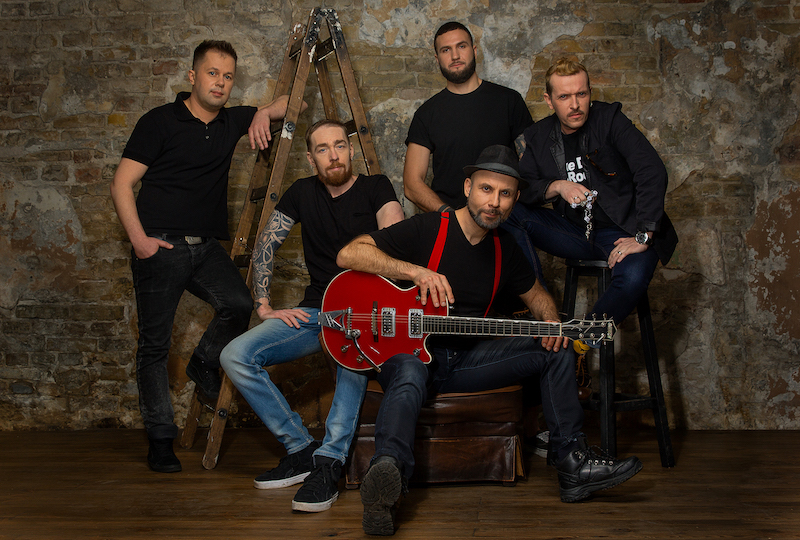Legendary Lebanese writer Kahlil Gibran once said, “Music is the language of the spirit. It opens the secret of life bringing peace, abolishing strife.” Russia’s long, grinding war of attrition with Ukraine has caused terrible carnage.
Nevertheless, it hasn’t broken the spirit of Ukraine’s leading musicians who are using their voices and instruments as their weapons.
Rolling Stone correspondent Hugh Bohane spoke with six of Ukraine’s esteemed performing artists, taking their music to a newfound global audience, while fighting not only an active war but also a cultural one.
Andriy Khlyvnyuk, lead singer of BoomBox
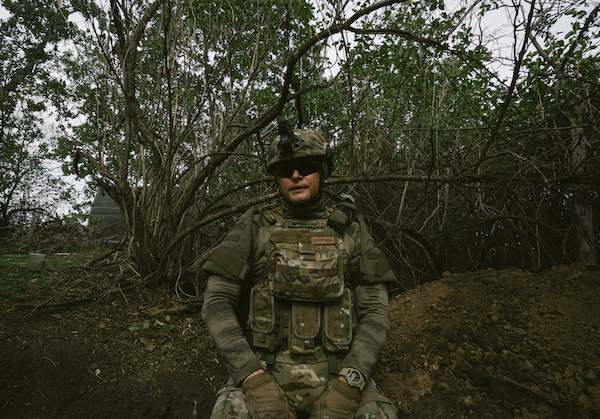
“I’m alive, I’m not injured, I am not hungry, and my socks are dry, so I am okay,” says Andriy Khlyvnyuk, lead singer of Ukrainian rock band BoomBox, over Zoom. He is currently fighting on the frontline as part of a special Ukrainian patrol unit as a drone operator.
Khlyvnyuk is dressed in full army fatigues, sitting in the dark, as he speaks to me over a choppy online call. The forty-two-year-old has been, understandably, elusive since he volunteered to defend his homeland.
As a native of Ukraine’s capital city of Kyiv, Khlyvnyuk says it was an easy decision for him to join the war effort. “Kyiv was under attack and I live there. And my kids were there, and so I didn’t have a choice other than to defend my capital.
Love Music?
Get your daily dose of everything happening in Australian/New Zealand music and globally.
“We have been having this problem for centuries with those crazy neighbours, as soon as they got a little bit of power they started saying that my nation doesn’t exist, that we are Nazis and that we don’t deserve to be an independent nation, and other shit like that.”
He goes on to note that every country has its right to be sovereign. “We are a democratic, multicultural and multi-religious state and the whole world’s community is okay with that.”
Following Russia’s military invasion of Ukraine in late February, Khlyvnyuk quickly ensured his mother and children were evacuated to safety, gathered what weapons and ammo he could, and joined his friends in the Ukrainian Territorial Defense Force, “because if you run, you are going to be shamed and attacked again.”
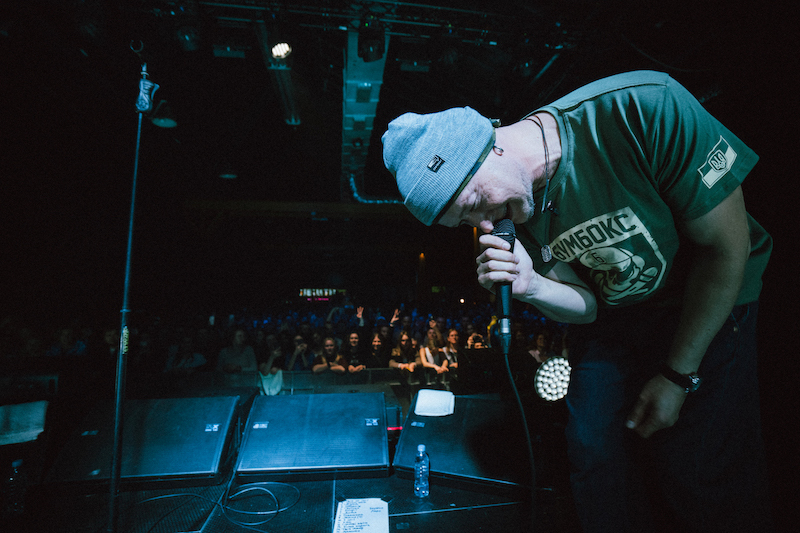
Within days of joining, he had recorded an a cappella version of the Ukrainian folk song “Oh, the Red Viburnum in the Meadow” dressed in fatigues and carrying an automatic rifle in Sophia Square in Kyiv. The Bell Tower of Saint Sophia Cathedral was depicted in the background. The recording, which he posted to Instagram on February 27, went viral and was picked up by international broadcasters, including the BBC in England, where it was seen by David Gilmour of Pink Floyd. Gilmour quickly convinced his ex-band mate and drummer Nick Mason, and their long standing bassist Guy Pratt, to bring the band out of retirement, writing and recording the first new Pink Floyd material in twenty-eight years — “Hey, Hey, Rise Up!” — which sampled Khlyvnyuk’s original video and vocals. Weeks later, and with some effort, Gilmour managed to FaceTime Khlyvnyuk, who by this time was recovering in hospital with shrapnel wounds to his face after his unit came under fire. With his blessing, Pink Floyd released the song in April, with all proceeds going to Ukrainian humanitarian relief.
Before the Zoom line drops out, Khlyvnyuk makes a point of noting that the Australian-built armoured Bushmaster vehicles donated to Ukraine “work very well” having seen them in action firsthand, and reveals that he has been listening to “Ozzy Osbourne, AC/DC and lots of reggae” on the battlefield.
Alyona Alyona, rapper and songwriter
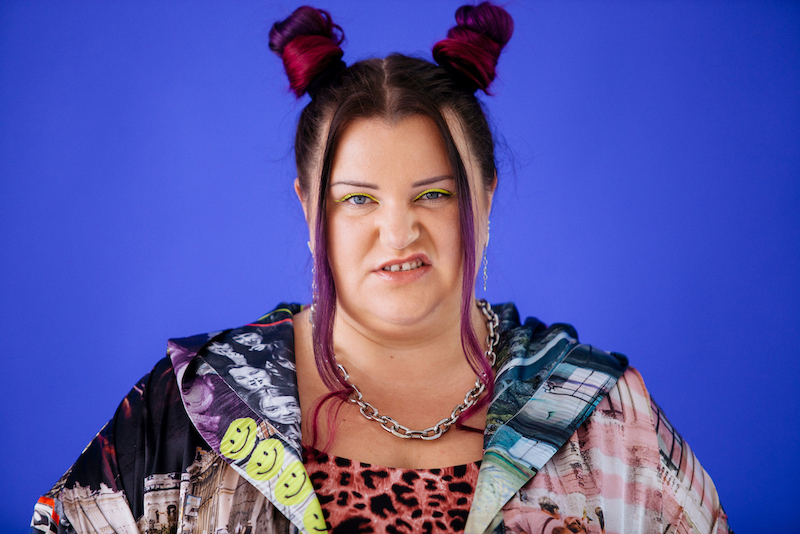
Rolling Stone interviewed thirty-one-year-old Alyona in an underground shelter in Kyiv on Monday, October 17th, a day that saw the capital city bear the brunt of nearly thirty Iranian-made “kamikaze” drones launched by Russia.
“Today I came from Poland to Ukraine, and Iran’s drones met me at the railway station. We had to run and we heard big explosions and I had twenty kilos of luggage… today is a super hard day,” said Alyona.
“During these past eight months of the war, I was scared. I didn’t expect this, but I understand what I have to do. I am an internet soldier, I am a musician soldier, I do my job.”
Like many other prominent musicians, the Ukrainian government has utilised Alyona in its cultural diplomacy efforts, supporting them to tour and travel internationally, raising awareness and money for charitable causes back in Ukraine.
“Thanks to all the European countries which have taken Ukrainian refugees, [it’s] given us military and humanitarian aid. And I want to say please don’t forget about the war and don’t stop donating, the attention of all the world is super important to us.”
When she’s making music, Alyona raps in her native Ukrainian language about everyday life, love and hope. She says that it is important for her to stay authentic and hopes that she can be a good example to other non-English speaking artists. Especially to young and upcoming female Ukrainian musicians.
“The [foreign] audiences can feel my vibe, feel my energy and my melody and it doesn’t matter where you are from or what language you rap in,” she said.
The war has impacted Alyona’s outlook on life and career, but it has made her revisit how she financially invests in her music. “Now, I won’t shoot super expensive music videos because I put this money towards donations instead, I don’t buy expensive clothes because a rocket could kill me at any moment,” she said.
Alyona has collaborated on tracks with KALUSH (this year’s Eurovision winner), Jamala, Jerry Heil, KOLA and more. She has recently been in North America on a “Save Ukraine” tour with other well-known Ukrainian artists.
“We are having a boom of Ukrainian music now because we have closed ourselves off from the Russian market and there are a lot of new spaces for us.”
Vadym Krasnooky, frontman of rock, hillbilly, psychobilly band Mad Heads
Kyiv native, forty-eight-year-old Vadym had been living in Canada for some time until just before the invasion and felt compelled to return to his nation to be with his people. His rock band, Mad Heads, founded twenty-five years ago, had supported the Ukrainian army by playing fundraising concerts and performing for them on the frontlines back in the 2014/15 war.
More recently, Vadym volunteered doing briefings at the Ukraine Media Center in the western Ukrainian city of Lviv. Although his band are on a temporary hiatus while the war is ongoing, Vadym penned the song “Cruiser Moskva” about the sinking of the Russian ship Moskva last April.
In the weeks following the war, Vadym said he couldn’t pick up the guitar — he was still in shock and wasn’t in the mood to sing while he had to care for his elderly mother and other family members.
“After that, I found some time to play and sing for myself and it was a great relief and I thought that probably I have to play for other people too,” he said. “The day the Russian ship sank, boom, I got the idea to write a song about it. This song is about the joy of winning, and it’s cheerful, and can motivate people to move through anything that happens in their life.”
Positivity and humour are something that Vadym is hoping to hold onto in these dark times. “We have lots of videos of Ukrainian soldiers dancing on the frontlines these days, and this is the way to win and keep peoples’ morale high.”
Vadym is old enough to remember when Ukraine was still under the Soviet Union (USSR) in its final years. He said many young Ukrainians like himself were listening to western music, and Soviet rock bands, with lyrics that opposed the regime.
“I think that was a great help in the collapse of the Soviet Union and the cultural war was won with the help of the West.
“Back in the late Eighties, I had a lot of Beatles albums copied onto cassette tape because it was impossible to get original vinyl or cassettes and back then you could go to jail for listening to western music. I remember the excitement of listening to something that was forbidden.”
Maryna Krut, also known as KRUTb, singer, songwriter and traditional bandura player
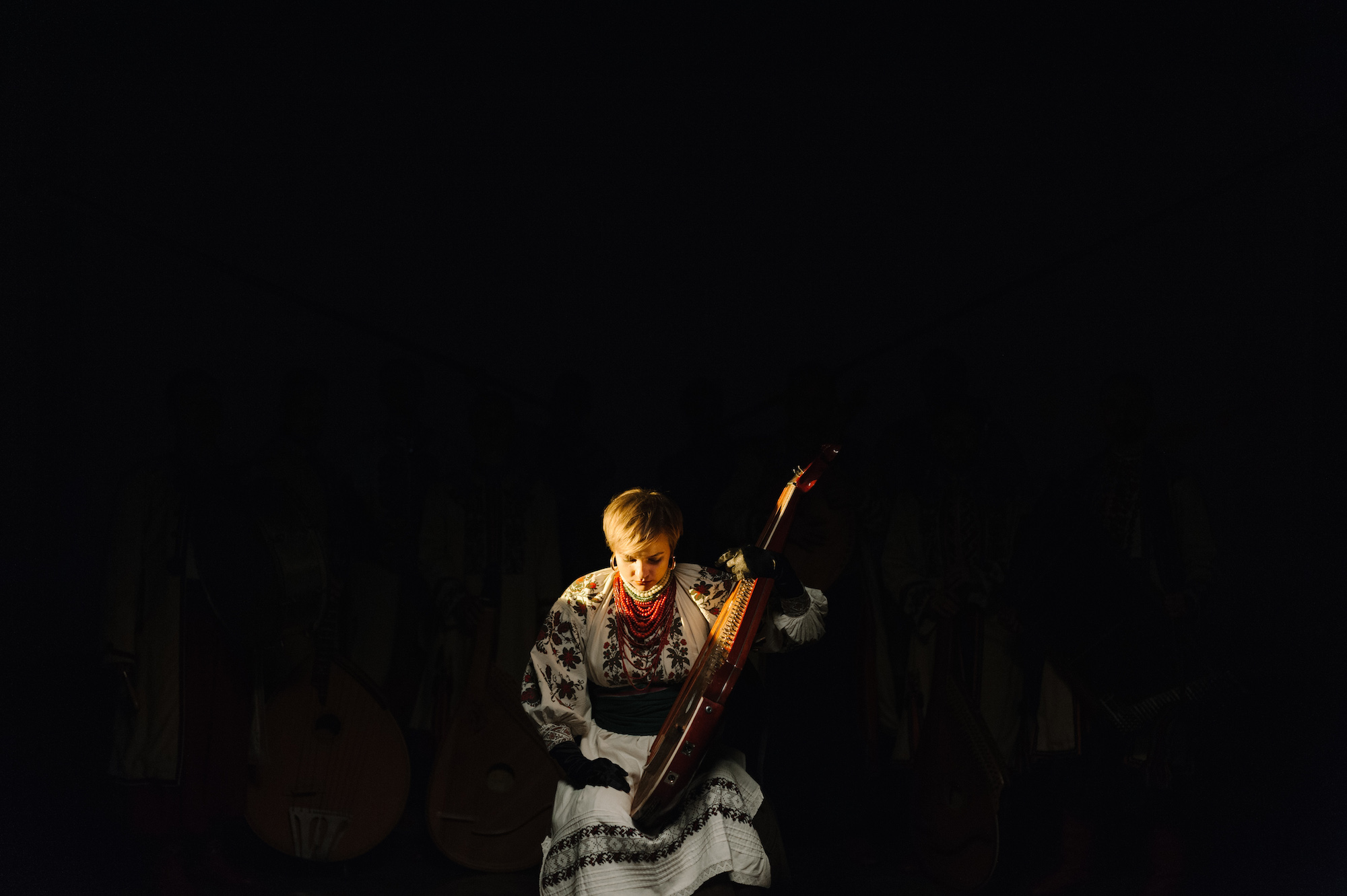
Twenty-six-year-old Maryna was born in a small city in western Ukraine and spoke to us from Lviv where she is currently based.
“This could be my last interview because right now we have rockets, maybe some rockets could hit Lviv city and go into my apartment and this could be my last day,” she told us from her apartment.
“Many of my friends, my manager, my bandura master crafter and my boyfriend are all on the frontline and they are in hell right now.”
As a past Eurovision finalist, Maryna learned the traditional Ukrainian plucked instrument, the bandura, when she was eight years old. The roots of the bandura go back as early as the nineteenth century, and in those days bandurists were often blind (many were former soldiers who lost their eyesight fighting for the Soviet Red Army) and referred to as kobzars or kobzari (a group of players).
Kobzars sang and played the bandura, and their lyrics were often a way to spread the truth about their Soviet overlords, and consequently they were heavily persecuted by the Federal Security Bureau (FSB).
“The kobzars always told the truth in their singing and told the real news and the Soviets didn’t like that.”
Between 1918-1920 the Bolsheviks killed an unknown number of bandurists during the Russian Civil War. Assassinations and oppression of bandurists continued by Soviet rulers into the 1950s.
When KRUTb turned fifteen-years-old, she wanted to break the conventional rules of what it is to be a bandurist.
“I dyed my hair pink, painted my nails black, wore leather jackets and started to play the bandura in a more modern, jazzy and funky way while mixing in pop vocals.”
KRUTb rebelled against her friends and family’s wish for her to attend university. However, her bandura teacher supported her decision and not receiving higher education eventually paid off.
“It was a long and hard journey even until now, but now they play my music in universities in Ukraine and the world now knows my music,” she said. “I couldn’t imagine taking another way because this was my dream and I think people can do anything in the world if they just have love in their hearts, anything is possible. Now we have a renaissance of Ukrainian culture and traditional instruments and many people are interested in this. I am so proud of my people.”
For many years, commercial radio in Ukraine would mainly play Russian language music, but today the majority of artists on the air are Ukrainian. Before the invasion, some Ukrainian artists would try to find exposure with the Russian market and stage concerts, but that has all changed. The Ukrainian Institute released an official statement last February barring artists to work/collaborate or have connections to the Russian music market.
“Refrain from presenting, performing, and promoting Russian culture and works of art while the war against Ukraine continues,” the statement read.
Susana Jamaladinova, known professionally as Jamala
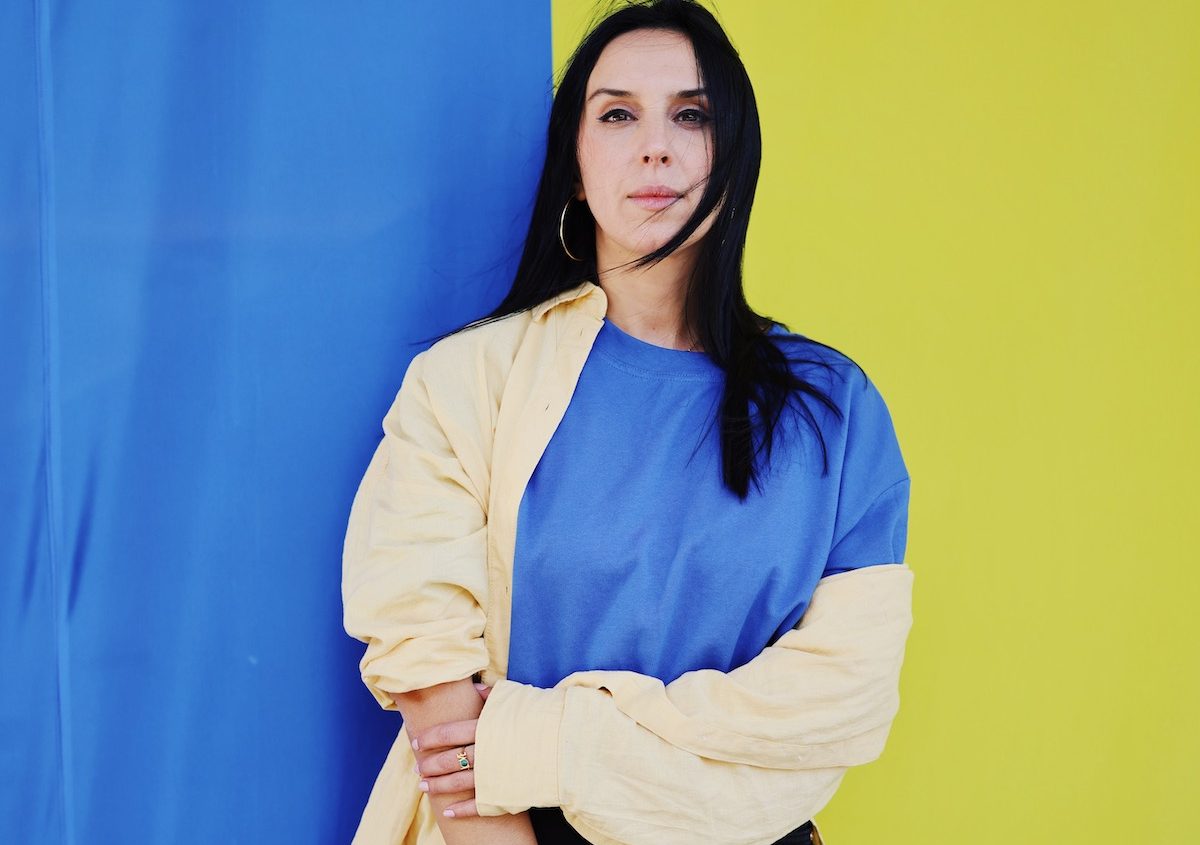
Thirty-nine-year-old Jamala won the Eurovision Song Contest in 2016 with “1944”, written about her great-grandmother’s deportation by the Russians from Crimea during World War II.
Like her great-grandmother before her, Jamala has also had to flee the Russian military. Speaking to Rolling Stone with the help of a translator from her rented apartment in Poland, Jamala said she and her two children have been separated from her husband. As a result of the war, all Ukrainian men aged eighteen to sixty have been banned from leaving the country.
“Only later did my husband get a temporary leave from the Ministry of Culture to visit me, as you can imagine after the invasion began my life changed,” she told us in tears and with a shaky voice.
“I have been working with The Yellow-Blue Foundation, I sang for The Voice of Lithuania where we fundraised approximately 55,000 euros [for the Ukrainian army], I am now in Warsaw doing Dancing with the Stars in Poland where we are fundraising for [Ukrainian] children’s healthcare.”
Jamala emphasised that her compatriots, women and children who have to live in basements in war-torn cities like Mykolaiv and Mariupol are having a much harder time than herself. She continues to work internationally and has travelled to different events in over thirty countries since February last year. For example, in Berlin, she raised a whopping sixty-seven million euros for Ukraine at the Eurovision national selections last March.
Rolling Stone asked Jamala what she thought about Ukrainian artists who have been neutral on speaking out about the Russian invasion and who have played concerts in Russia in recent years.
“I’m going to be clear on this, if you identify as a Ukrainian musician, I can come up with no justification on why someone would want to stay ‘neutral’. Who could not help helping?
“[…] I know that there have been some artists who have performed in Russia before, but since the war broke out, I’m not going to give any names. But I know that some of these people went as volunteers and they were fundraising, and they were fundraising for food, warm clothes, baby formula, and whatnot. And they did some very manual and kind of grunting labour. And I think that one of the reasons is that they might have tried to kind of punish themselves for what they have been doing in Russia.”
Jamala added, “And you know, like people come to your home, and they kill and they commit acts of genocide and terrorism. And, frankly, they destroy our national heritage quite systematically. And you look at all that and if you still are not compelled to help out, I mean, like, take a dog from a shelter, help a child whose life has just been ruined by the war. There are so many ways to help.”
Last November, President Volodymyr Zelensky held a private meeting with Jamala on the eve of her trip to America, where she was one of the recipients of this year’s Outstanding Artist Leadership Award presented by the US Atlantic Council at the Kennedy Center.
Jamala is using her music to help spread the word; her single “Thank you, Stranger” is dedicated to the neighbouring European nations that have welcomed Ukrainian refugees.
Krapka; KOMA
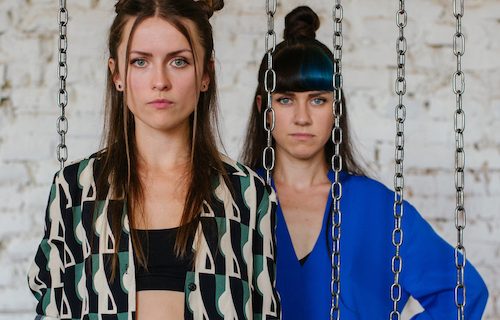
Photo by Tanya Vilchynska
Rolling Stone spoke to 29-year-old Alona Kovalenko and 33-year-old Ira Lobanok of upcoming Ukrainian electronic duo Krapka; KOMA in Lviv. The pair had just returned to Ukraine after touring in eight different countries across Europe, in some cities they shared the stage with Kyiv-based psychedelic rock band Love ‘n’ Joy.
“It was exhausting but fun, it was our first ever European tour and we wished the cause of this tour would have been a different one, not fundraising for Ukraine to defeat Russia but here we are,” said Ira.
Krapka; KOMA’s mission abroad was to show a human face to the invasion and communicate to their audience about the reality of Russia’s war beyond the news headlines.
“Our band has a very Ukrainian name, Krapka; KOMA which means semicolon in English. Our personal experience with language in our music is a flexible one and, in the future, we will maybe try to sing in a mix of Ukrainian and English,” said Alona.
Asher Robinson an Australian event manager, DJ and an independent volunteer for various aid groups in Kyiv
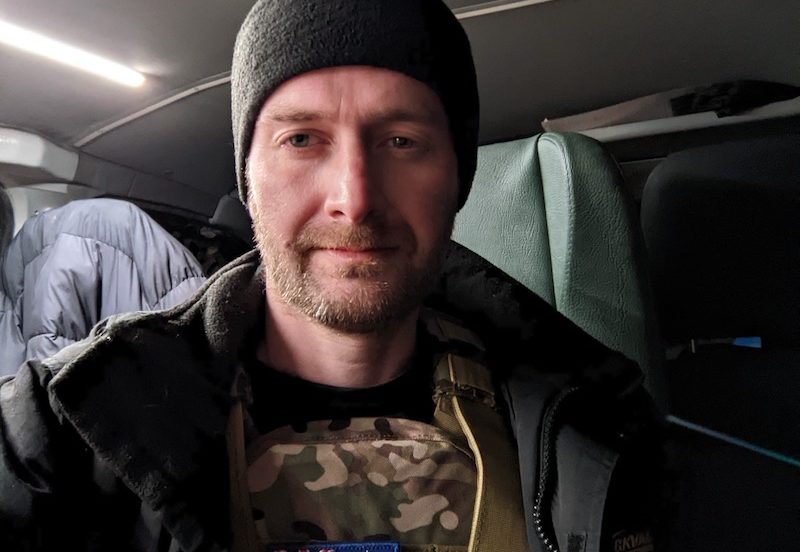
Thirty-seven-year-old Australian citizen Asher Robinson relocated to Ukraine in March last year amid the war to volunteer for various aid groups (Foundation Renaissance of Ukraine, Safe Passage 4 Ukraine, United Refuge and Help People). When he’s not volunteering, he DJs in clubs that raise money for the army in Kyiv, mixing Ukrainian and Australian tracks into his setlist.
“I’ve mainly been helping organisations with evacuations, interpreting, delivering aid, project managing and logistics some of which are skills I learned in event management back in Australia,” he said. “The initial period of evacuations on the Ukrainian borders was a pretty intense time.”
Asher’s gifts of koala bear clip-on toys from Australia to Ukrainian kids in the field proved to be a winner with young locals.


































